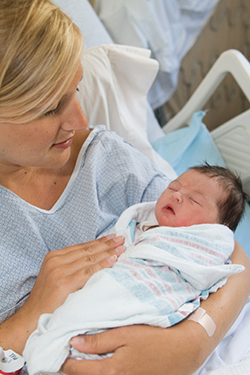Hospital discharge

Your length of stay in hospital will depend on whether you have delivered by caesarean, or a vaginal delivery. Different hospitals also have their own guidelines on the discharge of maternity patients. You should find out in advance what your expected length of stay in hospital will be. Some women choose to leave the hospital quite soon after delivery (of course this has to be approved by a doctor) while others stay for as long as possible.
There are options of going home early and having a midwife visit you at home for the week after the birth. This is quite a good option as you’ll be able to ask the midwife questions about situations as they arise, while at the same time you’re getting settled back at home with your partner.
Information
While you are in hospital, take advantage of the midwives and their experience. Ask as many questions as you can, listen to all of their advice and use what you find valuable. Some hospitals and birth centres offer classes to assist you in the care of your new baby, these include breastfeeding, bathing and settling. Attend all the classes available to you, they are a great source of information and it encourages you get up and walk around.
Immunisations
Your hospital or clinic will offer routine immunisations to your baby. These include Vitamin K. If you are discharging yourself soon after delivery, ensure you have all the information you need regarding these immunisations.
Nutrition in Hospital
Depending on the quality and abundance of food your hospital supplies, it may be a good idea to have a supply of healthy snacks in your room. You have just been through a very physical event and your body will want to rebuild its energy levels. If you are breastfeeding you may feel particularly hungry as your body adjusts to this new demand being placed on it. Breastfeeding can also make you feel extremely thirsty so it is a good idea to have a bottle or glass of water handy before you start the feed.
Visitors
Most hospitals allow your partner and other children to visit whenever they like. Most hospitals have a visitor-free time, offering a great opportunity for you to take a rest – even if you don’t feel like it.
Visiting hours are usually fairly strict towards non-family members and this is for a good reason. It is so that all of the new moms can have peace and quiet at set times of the day. Visiting hours can become quite hectic. Try to limit your visitors to a couple at a time and schedule people to come in at staggered times.
Although flowers are a traditional gift to bring to hospital you may like to suggest to friends that you would prefer something for the baby or even suggest that they might like to contribute to your new pram or cot. If you do receive a lot of flowers, be aware of their scent as it can become over powering for your new baby in the air-conditioned environment.
Breastfeeding
Starting to breastfeed can be a very difficult and emotional time. It is something that you and your baby will have to learn to get right together and once you do, it is the easiest and most wonderful experience. With the best of intentions, your midwives will all offer their own opinion on how to achieve the best result. Try not to get overwhelmed by the varying information, take it all in and remember that they are not going home with you. You will have to make the decision what’s right for you and your baby on your own.
The Blues
The “3 day blues” are caused by the sudden drop in levels of the hormones that helped sustain your pregnancy and are a normal part of your recovery after delivering your baby. You may feel teary, over tired and as if you are not coping. These feelings should pass within a few days. If they don’t, you may be suffering from Postnatal Depression.
Discharge from Hospital
Before you are discharged, you and your baby will be examined to ensure you are in good health. You should be provided with a baby health book that is used to record all of your baby’s health check-ups and immunisations including reminders for you to make your baby’s 6 week check-up appointments. Remember to have a properly fitted newborn safety car seat installed in your car.


